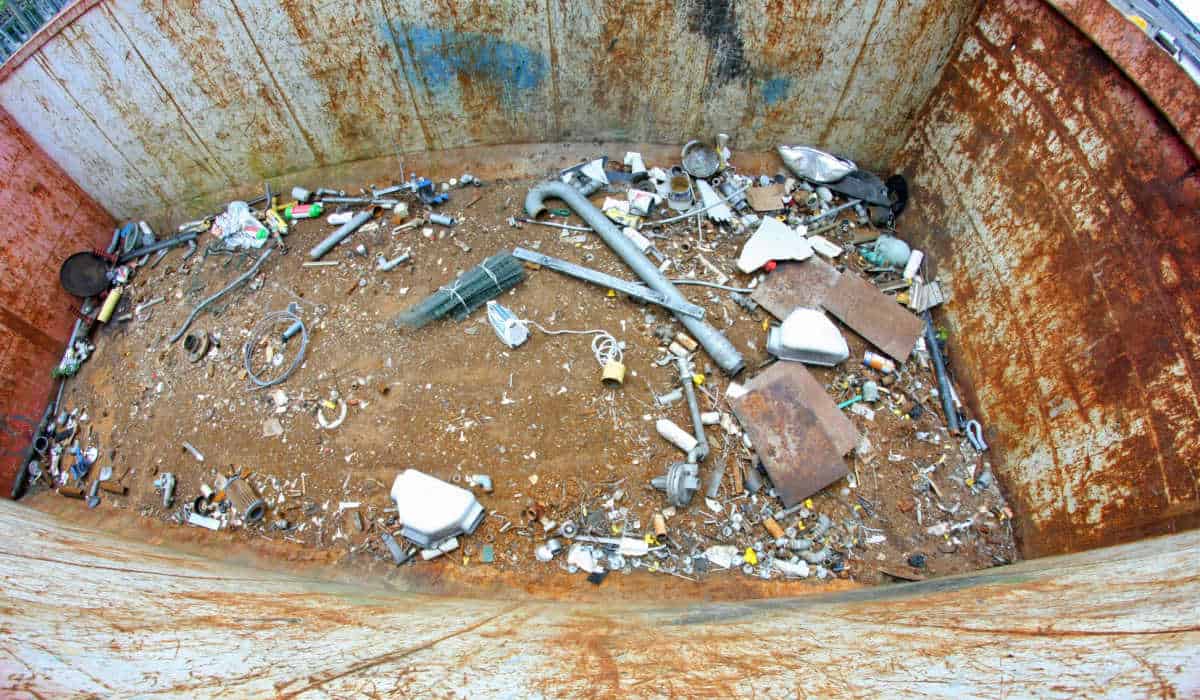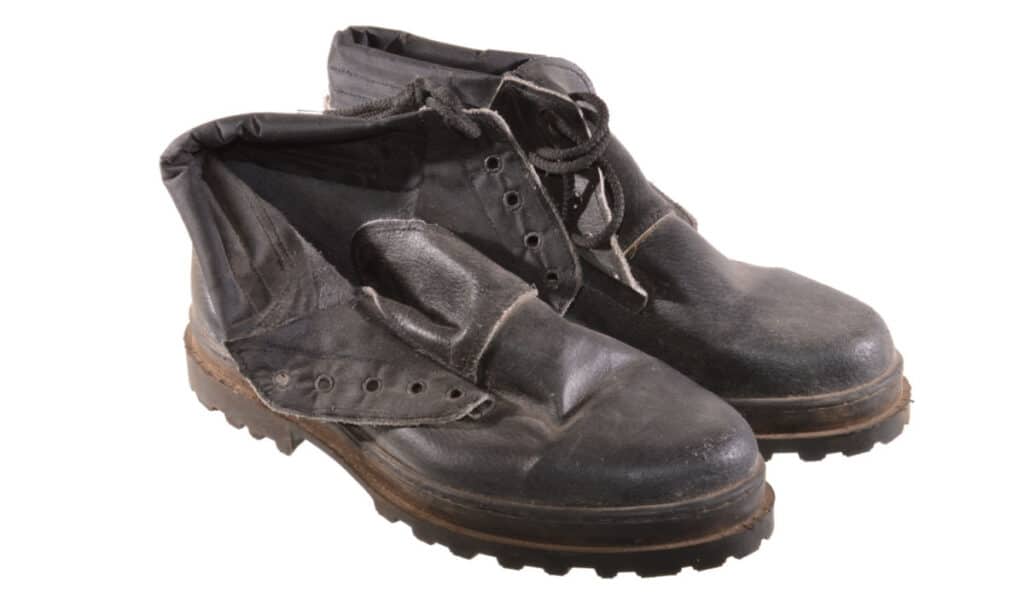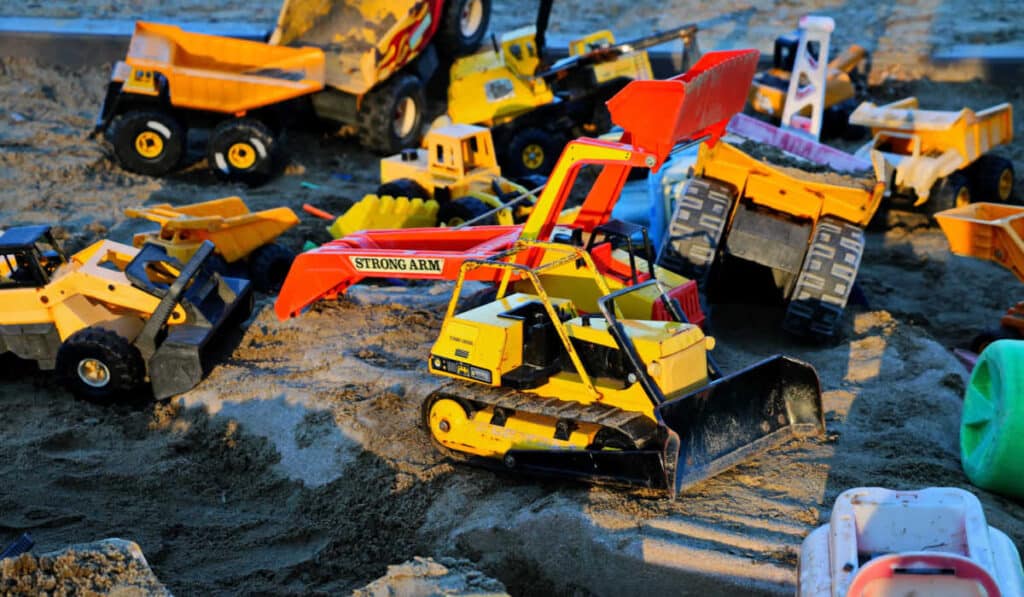As an Amazon Associate I earn from qualifying purchases.
Like many dumb high school boys I somehow convinced my parents that I needed a project car to work on. Somehow I didn’t have enough to do with just homework and a part-time job…
Predictably I ran short of money within just a month or two and needed to find some way to earn some extra cash. Since anything that required actually working for a boss was out I settled on helping my grandpa “clean up his farm” which basically meant asking how much of the crap he had laying around I could take to the scrap yard.
I ended up taking an entire truckload and trailer to the scrapyard and cashed out almost $1,000 which, at the time, was more than two months of part-time work for me.
Long story short, my love for making money from scrap metal was born. Eventually, it evolved into a full-blown dumpster diving and eBay reselling enterprise but I still have a fond place in my heart for gathering loads of “garbage” (usually for free) and turning it into cash the same day.
So let’s take a look at how you can get started making money from scrap metal (and we’ll even hit a method that people have used to turn $100 into $1,000 or more in a single day).
In this article, I’ll share my experiences and knowledge to help you achieve the same success. At least, if you’re willing to put in the work.
If you follow a few simple strategies and tips you’ll quickly realize that making money from scrap metal is not only viable but can be extremely lucrative. So, let’s dive in and explore the world of scrap metal recycling!
Table of Contents
The Scrap Metal Bussiness Model
First things first, if you’re looking to make money from scrap metal you’ll need to understand how it works. The business models are quite simple but you’ll want to choose which one is best for you and the area in which you live.
1. Dumpster Diving
Many people are able to make a decent part-time living just by gathering metal from commercial dumpsters (construction sites, behind stores, etc.).
This typically looks like driving around a pickup and gathering anything metallic and taking it home to sort and dismantle it before cashing in.
One of the main drawbacks here is that you’re dumpster diving and will have to be making the rounds at night.
On the plus side, you’ll likely see and gather way more than just metal and you’ll be able to sell or keep all types of other things (which may or may not be a good thing…).
Pro Tip – Check if dumpster diving is legal near you and have some excuses ready to go if you get caught…
2. The Junker
These are the guys who are advertising on Craigslist or via a flyer at the grocery store and say they’ll come to pick up your metal waste for free. They’ll also scour local classifieds for free/cheap metal that they can gather and haul.
Many people treat this one as a full-time job and schedule several pickups a day via trailer or truck.
I recently talked to a guy who did this full-time when he came to pick up an old swamp cooler and dryer we were getting rid of. His trailer was full to bursting with all sorts of metal objects that he had picked up that day, all for free.
3. The Wrecker
The Wrecker is literally just a junker on a higher scale. These are the guys who have access to a semi or large truck/trailer and can clean up after a construction crew, perform industrial cleanup of yards that have dozens of hoarded cars, etc.
While the investment here is much higher (as is the manpower required), the potential profit is much higher as well.
If you’re just getting into scrap metal, start with low-key dumpster diving or junking. Or just do what I did as a kid and walk down the street picking up aluminum cans.
What You’ll Need To Get Started
Transportation. If you’re gathering crap at any scale beyond picking up soda cans then you’ll need some sort of transport. To make any appreciable amount of money from general iron/steel scrap you need to be gathering thousands of pounds so many scrappers opt for a truck and trailer combo.
Protection. There’s nothing macho about slicing open your fingers while picking up some rusty metal. Wear slice-proof gloves and whatever other type of PPE is required for the job you’re doing.
Dismantling Tools. Having some basic tools to take your find apart will help you get top dollar for each type of metal. Get yourself a basic set of handtools (cheap is fine) and a pair of wire strippers (for copper wire).
Magnet. If you’re dumpster diving, having a magnet can help you quickly identify what is metal (it’s not always as obvious as you’d think). It also comes in super handy when sorting your finds by metal type.
A network of help. The more people you have on your team the more effective you’ll be (meaning the more money you’ll make). If people know what you do for your side hustle then they’ll be able to give you scrap, tell you where scrap is, and even help you load it if you need an extra set of hands.
At the end of the day, you really don’t need much to get started. However, making money is all about doing things more efficiently. If you’re trying to deliver scrap metal on your bike…it could be done but you might as well trade in your bike for an extra dollar or two while you’re there.
Types of Scrap Metal To Look For
Knowing what types of metals you’re looking for can make a crucial difference as there can be a 100x difference in the price of different metals when you sell them as scrap.
In general, non-ferrous metals, such as aluminum, copper, and brass, are typically worth more than ferrous metals like steel and iron.
I’ll include some of the current scrap prices here (they change daily) but just know that it changes drastically based on the type of metal it is, what it’s formed into, how it was formed, etc.
For example, let’s take a look at Aluminum. Here are some of the approximate prices you can expect for different types of aluminum:
- Aluminum – $.60/lb
- Extruded Aluminum – $.70/lb
- Aluminum Cans – $.44/lb
- Aluminum Wheels – $.67/lb
- Aluminum Radiators – $.41/lb
- Painted Aluminum Siding – $.51/lb
- Cast Aluminum – $.44/lb
And that’s just a small sampling.
However, before we get too caught up in the weeds, let’s take a look at the general divisions you’ll run into when collecting scrap:
| Metal | Description | Current Scrap Price |
|---|---|---|
| Iron | This is a common ferrous metal used in construction and automotive industries. | $0.035 |
| Steel | Also a ferrous metal, steel is an alloy of iron and carbon and is prevalent in construction and manufacturing. | $0.035 |
| Copper | A non-ferrous metal with high electrical conductivity, which makes it a desirable material for wiring and electronic components. | $0.21-3.10 |
| Aluminum | This non-ferrous metal is lightweight and corrosion-resistant, making it a popular choice for cans, foil, and automotive parts. | $.35-1.40 |
| Brass | A non-ferrous alloy consisting of copper and zinc, commonly found in plumbing fittings and decorative items. | $.38-2.15 |
| Stainless Steel | An alloy of iron and chromium, this ferrous metal is known for its corrosion resistance and can be found in appliances and kitchenware. | $.30-67 |
| Nickel | A non-ferrous metal that is often used to create alloys, such as stainless steel, adding corrosion resistance and strength. | $2.50-3.00 |
Ferrous and Non-Ferrous Metals
For starting off, it’s typically just enough to know the difference between ferros and non-ferrous metals (this is the reason that many junkers carry magnets).
The primary distinction between metals lies in whether they contain iron. If a metal has iron content, it is classified as ferrous. Examples of ferrous metals include iron and steel. These metals tend to be heavy, strong, and prone to rust.
On the other hand, non-ferrous metals do not contain iron and are often lighter and more resistant to corrosion. Common non-ferrous metals include copper, aluminum, and brass.
Knowing the difference between these metal classifications is crucial for scrap collection, as non-ferrous metals generally fetch a higher price at scrap yards. A helpful tip to identify ferrous metals is to use a magnet – if the magnet sticks to the metal, it’s ferrous; if not, it’s non-ferrous.
Preparation of Scrap Metal
In order to make the most profit from scrap metal, it’s important to prepare it properly. This involves two key steps: identifying the most valuable scrap metals and weighing your metals.
Sorting Your Metals
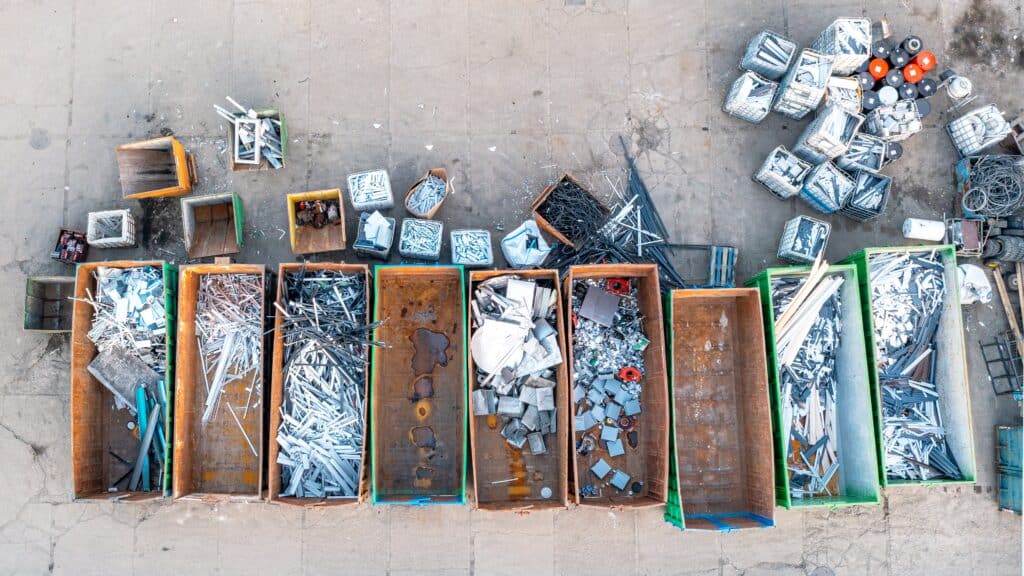
If you simply take a “contaminated” load to the scrap yard you’ll receive the bottom possible price for it (like $.03/lb).
How you sort your metals will depend on the scrap yard you go to (just ask them what they prefer). However, sorting by ferrous and non-ferrous is a good start.
To illustrate the importance here, however, imagine these two loads of scrap:
- A truck and trailer filled with 2,000 lbs of general iron/steel scrap (Value: $70)
- A 50lb cardboard box of stripped copper cable (Value: $80)
Selling Scrap Metal
Finding the Right Scrap Yard
One of the first steps in making money from scrap metal is to find a suitable scrap yard to sell the items.
As you might guess from the type of industry, not all of them are on the up and up. Many scrap yards are in less savory areas of town and have less than palatable business practices. So you’ll want to find one that has a good reputation and offers competitive scrap prices (which they publish or tell you up front).
You can ask around to see where other people go or just try a quick google search to see the best places to sell scrap near you.
Negotiating Prices
After you’ve identified a couple of options, do your homework on the prices that different places offer. If you are gathering huge amounts of scrap (especially valuable scrap) then you may have some pull to negotiate the overall price.
For the rest of us, we just have to go wherever pays the best.
If you are planning on scrapping long-term you’ll also want to keep an eye on the market and overall metal prices. Metal pricing is often cyclical and increases at certain points of the year (based on demand) so scrappers tend to save certain metals for high-points in price.
Maximizing Profits
One of the most important aspects of making money from scrap metal is to find ways to maximize profits and not miss any opportunity for generating extra income. It’s a bit of a competitive business so anything you can do to get a leg up on your fellow scrappers will be a plus to your bottom line.
Here are a few things you can do to stay up-to-date.
Using iScrap App
In order to stay up-to-date with the latest market prices for various scrap metals, I rely on the iScrap App.
It’s super helpful to have all the information that I need in one place and not have to search out pricing and guidance individually.
This app not only keeps me informed about current prices but also offers tips on how to sort and separate my scrap properly.
Collecting Particular Items
The key to maximizing my profits from scrap metal collection is to focus on the most valuable items. Here are some of the commodities I prioritize when collecting scrap:
- Aluminum cans: These are easy to find and can turn into a steady stream of income if gathered consistently.
- Copper wire and bare copper wire: Copper is a high-value metal, and collecting items like wiring is a great way to add to my wallet. Often-times you’re better off grabbing a couple of feet of heavy copper wire than 100 lbs of iron.
- Electric motors: Found in a variety of appliances, electric motors can be a profitable item to scrap, especially if I come across motors in large appliances and AC units.
- Computers: Old computers can contain valuable metals, and disassembling them for parts can increase earnings.
- Insulated wire: While not as valuable as bare copper wire, insulated wire still provides a reasonable income when collected and separated.
If you’re serious about optimizing your profits you’ll want to prioritize nonferrous metals like aluminum, copper, and brass, as they tend to be more profitable. Learning odd places where you can find wires, electronic motors, etc. will all help you out.
I’ve visited dumpsters right after other scrappers and gathered tons of wire and other valuable things that they simply pass over since they don’t “look like scrap metal”.
How Much Money Can You Make As A Scrapper? (Is It Profitable?)
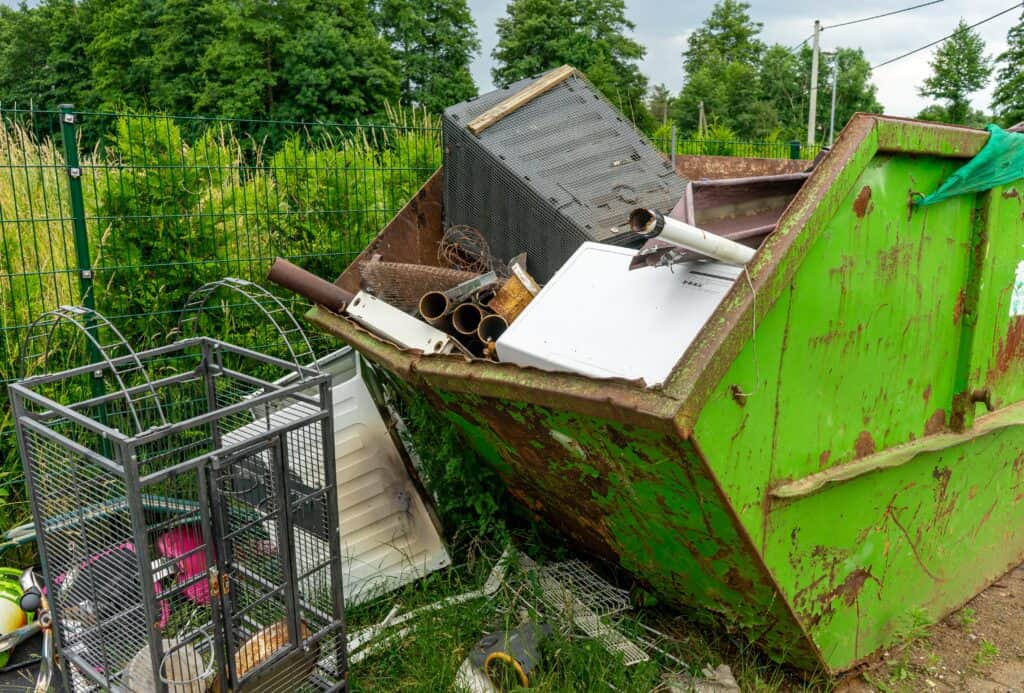
Asking how much money you can make as a scrapper is like asking how much money you can make as a business owner. Anywhere from very little (meaning nothing) to millions of dollars. It all depends on your operating ability and the scale of your business.
However many people who scrap part-time are able to add several hundred dollars (or more) on a weekend of picking up people’s stuff.
So, in short, metal scrapping can be a profitable side hustle. The amount of money you make depends on the type of metal being scrapped and its current market value.
You’ll want to include all of your costs when planning things out however as driving around all day (especially in a loaded truck) and getting lunch on the road can really eat into your profits.
The Junker Hacks – 2 Pro-Level Scrapping Tips
I have two parting tips for you – one for those who are trying to get started on a shoe string budget and one for those who are limited on time and want to squeeze a bit more money out of their scrap runs.
Collecting Without A Truck
I have an electrician apprentice friend who rides the bus to work every day. He gathers every bit of ‘trash” wire he can (as well as other valuable scrap metal) and takes it home in a bag every day. Last month he was able to cash in almost $400 at the end of the month which really helps out in paying the rent.
Secondly, it you are able to get access to a good amount of scrap you can rent a truck from Home Depot for $20 or so to make your run.
Multitasking
Lastly, if you are dumpster diving for your scrap you’ll want to consider gathering other types of valuables as well.
In the past 7 years, we’ve sold over 10,000 items on eBay and hundreds of them have come from dumpsters.
Related Reading – 31 Non-Clothing Items To Sell On eBay
Also, be aware that what you can sell on eBay (or what you don’t want to ship) can also be sold locally or to a pawn shop. Things are almost always worth more not as scrap so that should be your last resort if you’re pinching pennies.
Conclusion
At the end of the day, figuring out how to make money from scrap metal really isn’t rocket science.
What is difficult is beating your ever-increasing competition.
However, even though it’s more saturated than ever, there’s still money to be made from scrap metal and it might as well be made by you. See you out there scrappin’!

